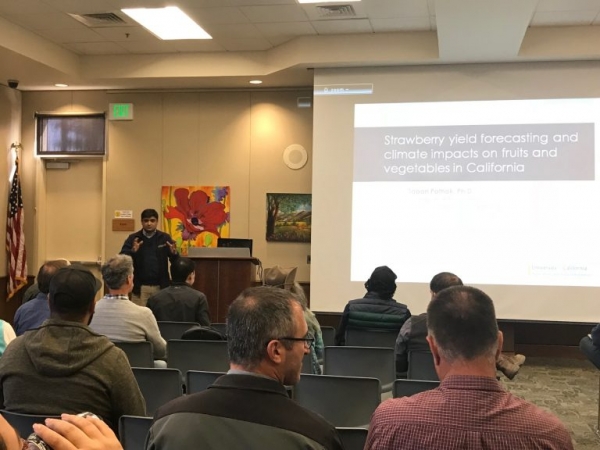
Dr. Tapan Pathak is a University of California (UC) Cooperative Extension Specialist in climate adaptation in agriculture at the UC Merced Sierra Nevada Research Institute and spends his days translating research into practice. An agricultural engineer by training, Pathak first brought academia into the literal field during his Master’s program at Utah State University, doing research with potato farmers in Idaho.
Thoroughly enjoying interacting with growers, he focused on applied climate science in agriculture while completing his doctorate at the University of Florida. He went on to be an extension faculty in University of Nebraska – Lincoln before coming to California where he dove deeply into the state’s diversified agricultural system and with it, diversified adaptation strategies. For Pathak, food security is a primary concern when considering the global impacts of climate change and ensuring the resilience and adaptability in California agriculture is vital.

As an Extension Specialist, Pathak meets with growers to answer their questions about what types of crops and strategies work best for their area given weather patterns. Like many others in the time of COVID-19, Pathak’s extension work has transformed into Zoom extension, which can be particularly challenging for a land-based profession. He has been able to continue his research which is focused on adaptation and tracking the agricultural impacts of climate change. Fortunately, much of his data collection adapts well in a virtual age because he can use remote sensors to monitor field activity.
Pathak is a member of CalCAN’s Science Advisory Council, and he has partnered with us in numerous ways including providing expert testimony on a climate adaptations bill and taking part in our 2018 adaptation listening sessions. At CalCAN’s 2019 Summit, Pathak was honored with a Climate & Agriculture Leadership award.
"Part of my work is focused on quantifying the impacts of climate change on agriculture. This is important because once we know what we are facing, then we know how to create solutions…we have 400 crops in California and each crop responds to climate differently. When we think about adaptation, we need to think about crop specific and region-specific solutions."
One of Tapan’s current projects is a decision-support tool called Cal AgroClimate, developed in partnership with the United States Department of Agriculture (USDA) California Climate Hub. Inspired by the decision-making web support tool AgroClimate developed for the Southeast, which Pathak learned about while completing his doctorate, this tool gives growers region-specific predictions about extreme weather events to they can minimize crop loss. In other words, it is a digital version of the services Pathak provides personally for growers now. He is working on adapting the tool to several important crop types and microregions all over the state.
An imperative for state funding for adaptation tools
As we wrote last week, the CalCAN-sponsored bill AB 1071 (Limon) would fund a pilot grant program to develop tools, facilitate trainings for farmers, and fund technical assistance providers to ensure their effective use. The bill has received unanimous bipartisan support in all of its votes to date.
Cal AgroClimate is a tool that can make our farms and ranches more resilient and one that AB 1071 would support, building on the work begun by Pathak and his team. With California’s incredibly diverse and high value agricultural sector, the economic and food security benefits of mitigating weather-related crop losses is huge. As Pathak says, “Farmers need science-based solutions now more than ever – anything that provide specific solutions to the impacts of climate change is of huge value.”
What does Cal AgroClimate actually do?
Cal AgroClimate answers the calls of farmers and ranchers for tailored weather information. Cal AgroClimate crunches complex weather predictions into area and crop specific alerts and related actions, mitigating risk and saving valuable time and resources for farmers and ranchers. One function of this system would alert a farmer of extreme weather events 10-14 days ahead of time, allowing them time to prepare.
"Climate change is making it harder for farmers to avoid crop losses because weather events are becoming so unpredictable and severe. Minimizing crop loss is critical not only to keep farmers in business but to protect our food security."
Take the heat this summer, for example. One of the major ways farmers can mitigate potential crop loss due to extreme heat is by adjusting irrigation timing. If notice of an upcoming heat wave is provided with enough time, growers could make the necessary arrangements to manage their water supply effectively and ensure their irrigation is working properly for water use efficiency. They could also coordinate farmworker schedules to avoid extreme heat days.
The same system works for all seasons: if farmers and ranchers were aware of an early frost two weeks before it hits, they could protect their crops with coverings, mitigating a surprise crop loss. With access to predictions even further ahead, farmers and ranchers could tailor their crop choices to those best suited to the expected weather conditions.
Pathak works with farmers and ranchers who are already facing the impacts of climate change and knows that the frequency and intensity of extremes will continue to rise in the future. Science-based solutions, like Cal AgroClimate are urgently needed tools for all farmers and ranchers to ensure long term food security and farm viability.


